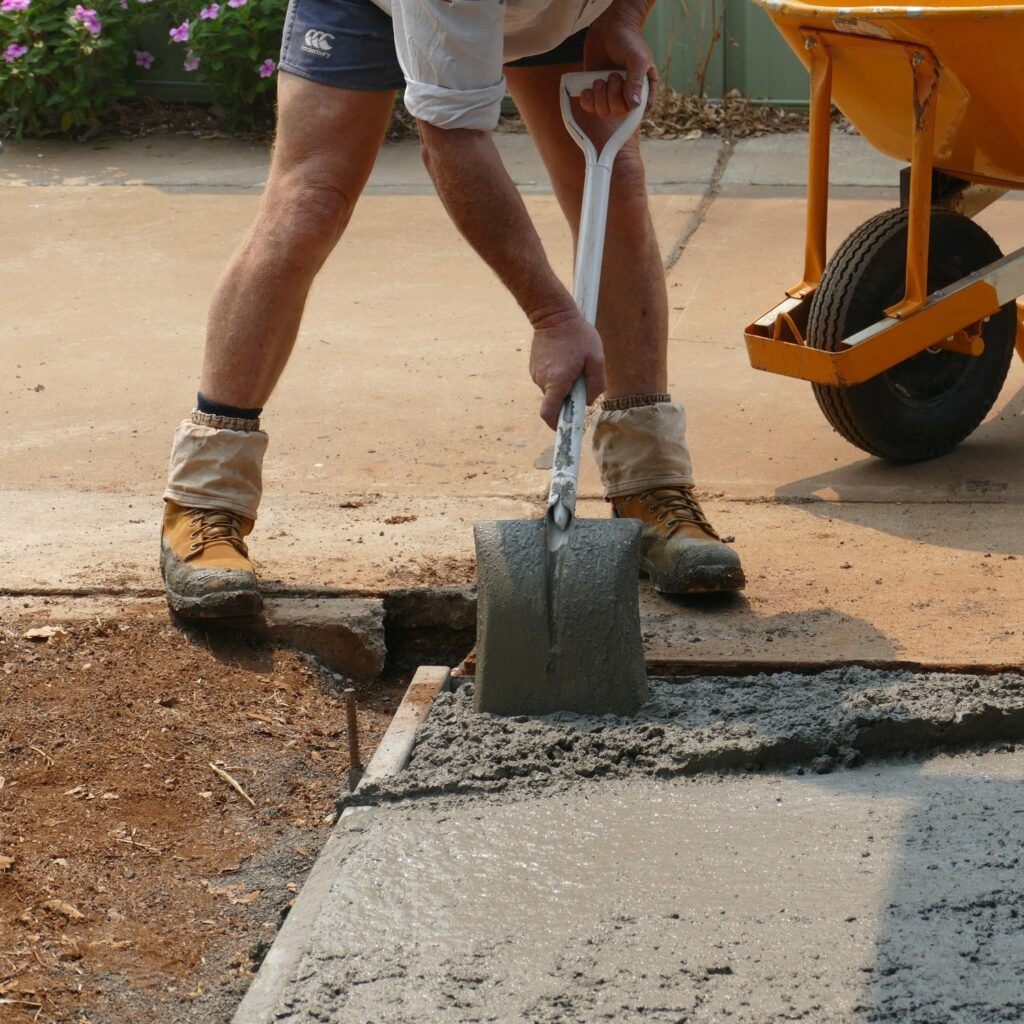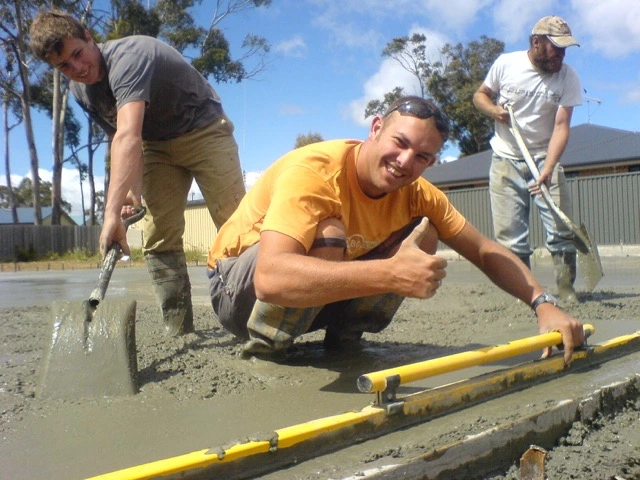Concreters: The Ultimate Guide to Finding and Hiring the Best Professional for Your Concrete Project
Selecting the right expert is crucial for an effective outcome when starting any kind of concrete project, be it a patio, driveway, or foundation. When hiring a concrete contractor specialist, keep the following important factors in mind to make sure your project is in good hands. For more information feel free to visit https://professionalconcretedrivewaysauckland.com/ and find out more about how to choose the top expert for your concrete project.
Begin by evaluating the professional's experience and expertise in concrete work. Look for a contractor with a proven track record of successfully completing projects similar to yours. Experienced professionals are more likely to navigate challenges effectively and deliver high-quality results.
Verify that the concrete professional holds the necessary licenses and certifications required by your local authorities. Proper licensing ensures that the contractor meets industry standards and regulations, giving you confidence in their ability to meet your project's requirements. A trustworthy concrete contractor guarantees reliable and high-quality services for your construction needs.
Research the contractor's reputation by checking online reviews, testimonials, and asking for references from past clients. A reputable professional will willingly provide references and showcase their portfolio, allowing you to assess the quality of their work.
Ensure that the concrete professional has adequate insurance coverage. This includes liability insurance to protect against property damage and worker's compensation to cover any injuries on the job. Insurance provides an additional layer of security for both you and the contractor.
Effective communication is key to a successful project. Assess the contractor's communication skills during the initial consultation. A contractor who listens to your needs, provides clear explanations, and maintains open communication throughout the project is more likely to deliver results aligned with your expectations.
Transparent pricing is essential for a smooth working relationship. Obtain detailed estimates from potential contractors, including materials, labor, and any additional costs. A transparent budget helps prevent misunderstandings and ensures that both parties are on the same page.
Discuss the expected timeline for your project and ensure it aligns with your needs. A realistic and well-planned schedule demonstrates the contractor's professionalism and commitment to delivering timely results. Clarify milestones and deadlines to avoid unnecessary delays.
Assessing Qualifications and Experience
Check the contractor's qualifications and certifications first. Seek memberships in associations for professionals, such as the National Ready Mixed Concrete Association (NRMCA) or the American Concrete Institute (ACI). These connections show a dedication to continuing education and industry standards.
Examine the contractor's portfolio and inquire about their past projects. A seasoned concrete professional should be able to showcase a diverse portfolio of completed works. Pay attention to projects similar to yours in scope and complexity to gauge the contractor's expertise in handling specific challenges.
In addition to general experience, consider the contractor's specific industry experience. Different concrete projects, such as residential driveways or commercial concrete foundations, may require specialized knowledge. A contractor with relevant experience is better equipped to address the unique requirements of your project.
Client testimonials provide valuable insights into the contractor's performance and client satisfaction. Request references and reach out to past clients to inquire about their experiences. Ask about the contractor's ability to meet deadlines, handle unexpected issues, and maintain open communication throughout the project.
A qualified and professional concrete contractor should possess a deep understanding of the technical aspects of concrete work. During interviews or consultations, ask about the contractor's knowledge of concrete mixtures, curing processes, and any advancements in the field. This demonstrates a commitment to staying updated on industry best practices.
Hiring concrete contractors ensures expert craftsmanship and precision in executing construction projects, guaranteeing durable and reliable concrete structures tailored to your specific needs.
Ensure that the contractor holds the necessary licenses and permits required for your specific construction project. Licensing not only verifies the contractor's qualifications but also ensures compliance with local regulations. Request documentation and verify the information with the relevant licensing authorities.
Inspect the quality of the contractor's workmanship by visiting completed projects or viewing photos of their past works. Look for precision in finishing, attention to detail, and durability. A reliable concrete contractor who takes pride in their work is more likely to deliver a final product that meets or exceeds your expectations. Concrete surfaces provide a durable and versatile foundation for various applications, ranging from driveways and sidewalks to industrial floors and architectural elements.
Consider the contractor's professional network and relationships within the industry. A contractor who collaborates with reputable suppliers, subcontractors, and other professionals is more likely to have a reliable support system, contributing to the overall success of your project.

Informed Decision-Making: Questions to Ask Potential Concrete Professionals
Can you provide a detailed estimate?
Begin by requesting a comprehensive estimate that outlines all costs, including materials, labor, and any potential additional expenses. This transparency helps you understand the financial aspects of the project and prevents surprises down the line.
What is your experience with projects similar to mine?
Evaluate the contractor's familiarity with projects similar to yours. Ask about their experience, challenges encountered, and how they addressed similar issues. This information provides insight into their ability to handle the specific requirements of your project.
Are you licensed and insured?
Ensure the contractor holds the necessary licenses and insurance coverage. Licensing indicates adherence to industry standards, while insurance protects both you and the contractor in case of accidents or damages during the project.
What is the expected timeline for completion?
Discuss the timeline for your project, including start and end dates, milestones, and potential delays. A clear understanding of the schedule helps manage expectations and ensures the project aligns with your timeframe.
Can you provide references from past clients?
Request references and contact information for past clients. Speaking with individuals who have worked with the contractor offers valuable insights into their communication, reliability, and the overall satisfaction of previous clients.
How do you handle unexpected issues or changes during a project?
Inquire about the contractor's approach to unexpected challenges or changes in the project scope. A flexible and adaptable contractor demonstrates the ability to navigate unforeseen circumstances without compromising the project's quality.
What is your preferred method of communication?
Establish clear communication channels by discussing the contractor's preferred method of communication. Whether it's email, phone calls, or regular site meetings, aligning on communication expectations ensures a smoother collaboration.
Can you provide a written contract?
A written contract is crucial for outlining the terms of the agreement, including project details, costs, payment schedules, and any specific conditions. Review the contract carefully and ensure it covers all aspects of the project.
How do you handle cleanup and site maintenance?
Discuss the contractor's approach to site cleanup and maintenance during and after the project. A responsible contractor ensures that the work area is kept tidy, minimizing disruptions and ensuring safety.
What warranties or guarantees do you offer on your work?
Inquire about any warranties or guarantees on the completed work. A contractor who stands behind their craftsmanship is more likely to provide reliable and durable results.
Certainly! Let's move on to Step 5 and address the fourth question: “Are there specific licenses and certifications I should look for when hiring a concrete specialist?” Here's a 500-word article providing guidance on the licenses and certifications you should consider when hiring a concrete professional.
Licenses and Certifications
State Contractor's License
One of the primary licenses to look for is a state contractor's license. This ensures that the contractor has met the legal requirements set by the state and possesses the necessary skills and knowledge to undertake construction projects, including concrete work. Verify the license with the relevant state licensing board.
Bonding
A bonded contractor provides an additional layer of protection for the client. A surety bond serves as a financial guarantee that the contractor will fulfill their contractual obligations. It offers recourse in the event of non-completion or issues with the project.
Concrete Specific Certifications
Look for concrete-specific certifications that demonstrate a contractor's expertise in working with concrete. Certifications from organizations like the American Concrete Institute (ACI) or the National Ready Mixed Concrete Association (NRMCA) indicate a commitment to best practices and industry standards.
Insurance Coverage
While not a license, insurance coverage is a critical component of a contractor's qualifications. Ensure the contractor carries liability insurance and worker's compensation insurance. Liability insurance protects against property damage, while worker's compensation provides coverage in case of injuries on the job.
Specialty Certifications
Depending on the nature of your project, consider any specialty certifications that may be relevant. For example, a contractor specializing in decorative concrete may hold certifications related to staining or stamping techniques. These certifications showcase a higher level of expertise in specific aspects of concrete work.
Local Permits
While not a license per se, obtaining the necessary permits for your project is a crucial step. A responsible contractor will take care of securing the required permits before commencing work. This ensures compliance with local building codes and regulations.
OSHA Certification
A contractor with certification from the Occupational Safety and Health Administration (OSHA) demonstrates a commitment to safety standards. OSHA certification indicates that the contractor prioritizes a safe working environment for both their team and clients.
Environmental Certifications
In environmentally conscious times, certifications related to sustainable and eco-friendly practices can be valuable. Look for concrete contractors who may have certifications related to green building or environmentally responsible concrete construction practices.
BBB Accreditation
While not a license, accreditation from the Better Business Bureau (BBB) can provide insights into a contractor's reputation. BBB accreditation signifies adherence to ethical business practices and a commitment to resolving customer complaints.
Manufacturer Certifications
For projects involving specific materials or products, inquire about manufacturer certifications. A contractor with certifications from material suppliers demonstrates familiarity with quality products and proper installation techniques.

Smart Budgeting: Tips for Hiring a Quality Concrete Professional without Breaking the Bank
Start by clearly defining your budget for the concrete project. Identify the maximum amount you're willing to spend, and consider allocating contingency funds for unexpected expenses. Having a well-defined budget provides a framework for evaluating potential contractors and makes it easier to negotiate.
Don't settle for the first quote you receive. Reach out to multiple concrete professionals to obtain a range of quotes for your project. This not only gives you a better understanding of the market rates but also allows you to negotiate with reliable concrete contractors to find a price that aligns with your budget.
If your project involves multiple phases, prioritize them based on urgency and functionality. You may be able to complete the project in stages, allowing you to allocate funds more efficiently. Prioritizing essential phases first can also help you secure the most critical elements of your residential and commercial project within budget.
Discuss material options with your contractor to find cost-effective alternatives without sacrificing quality. Some projects may allow for the use of alternative materials that meet your requirements while offering cost savings. Be open to exploring different material options that align with your vision and budget.
Work closely with your concrete professional to optimize the project design. Simplifying design elements can contribute to cost savings without compromising the structural integrity or aesthetic appeal of the final product. Streamlining the design can also reduce labor and material costs.
Consider the timing of your project. Scheduling work during the contractor's off-peak season may result in more competitive pricing. Additionally, planning well in advance allows you to secure favorable rates and ensures that the project fits comfortably within your budget constraints.
Negotiate payment terms with your chosen contractor. Some contractors may offer flexible payment schedules or discounts for upfront payments. Discussing payment terms upfront allows you to align the payment schedule with your budget and may provide opportunities for cost savings.
Openly communicate your budget constraints with potential contractors. A transparent discussion about your financial limits allows contractors to tailor their proposals to meet your budget while maintaining the quality of work. Contractors may offer creative solutions to achieve your residential and commercial concrete project goals within the specified budget.
Depending on the scope of your project, explore opportunities for do-it-yourself (DIY) tasks. While certain aspects of concrete work require professional expertise, smaller tasks such as site preparation or cleanup may be manageable as DIY projects. Just be sure not to compromise safety or quality in the concrete cutting process.
If your budget is tight, explore financing options that may be available. Some contractors offer financing plans, and external financing options could provide additional flexibility. However, carefully review the terms and interest rates to ensure that financing aligns with your overall budget strategy.
Conclusion
Starting a concrete project is a complex process that needs to be carefully thought through at every stage. From evaluating the qualifications and experience of a concrete professional to understanding the role of insurance, assessing past projects, and smart budgeting, the key lies in informed decision-making.
To ensure success, prioritize research, communicate openly, and explore cost-effective strategies without compromising on quality. By aligning your vision with the expertise of a reputable concrete professional, you can navigate the project journey with confidence, achieving not only your desired results but also a successful collaboration that stands the test of time.





